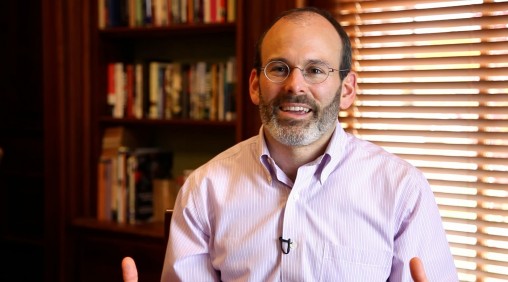Pay attention. Be astonished. Tell about it.
Ksenija Pavlovic sits down with a world renowned psychiatrist, Dr. Judson Brewer, to discover how mediation practice can help us perform better and recover faster from the failure.
Just as a tree, though cut down, can grow again and again if it roots are undamaged and strong, in the same way if the roots of craving are not wholly uprooted sorrows will come again and again – Dhammapada (338)
The ego is a bottomless pit of suckiness. And so you finally let go of the self that clings to itself (one definition of ego). True freedom comes when ego goes. – Shozan Hack Haubner
Judson Brewer MD PhD is the Director of Research at the Center for Mindfulness and associate professor in medicine and psychiatry at UMass Medical School. He also is adjunct faculty at Yale University, and a research affiliate at MIT.
 A psychiatrist and internationally known expert in mindfulness training for addictions, Brewer has developed and tested novel mindfulness programs for addictions, including both in-person and app-based treatments. He has also studied the underlying neural mechanisms of mindfulness using standard and real-time fMRI, and is currently translating these findings into clinical use. He has published numerous peer-reviewed articles and book chapters, spoken at international conferences, presented to the US President’s Office of National Drug Control Policy, been featured at TEDx, Time magazine (top 100 new health discoveries of 2013), Forbes, Businessweek, NPR and the BBC among others. For Novak Djokovic Foundation, he explains how paying attention helps us see how painful it actually is to continue bad habits. Dr.Brewer explains:
A psychiatrist and internationally known expert in mindfulness training for addictions, Brewer has developed and tested novel mindfulness programs for addictions, including both in-person and app-based treatments. He has also studied the underlying neural mechanisms of mindfulness using standard and real-time fMRI, and is currently translating these findings into clinical use. He has published numerous peer-reviewed articles and book chapters, spoken at international conferences, presented to the US President’s Office of National Drug Control Policy, been featured at TEDx, Time magazine (top 100 new health discoveries of 2013), Forbes, Businessweek, NPR and the BBC among others. For Novak Djokovic Foundation, he explains how paying attention helps us see how painful it actually is to continue bad habits. Dr.Brewer explains:
It is like holding a hot coal or burning stick when we are cold. We thought it was warming us up, but when we look closely, we see that it is actually burning us.
- What is the best way to understand mindfulness and why should we care about it?
The term mindfulness in modern day is a bit of a mess, as different people use it to mean many different things. The pali term that it was translated from is the word sati, which literally means remembering. One way to think of this is to remember to pay attention. [tweet_quote]Paying attention to what we do and how we interact with our world can profoundly change our relationship to it.[/tweet_quote]
- Meditation practice is becoming more prominent worldwide; people are getting on board with it. For those who are still skeptical about it, what would you say, from a standpoint of psychiatry, are the benefits of it for an overall wellbeing? How often should we meditate and how?
For those that are skeptical, I would say, keep it up! Be skeptical; see if this stuff really works for you based on your own experience. From the standpoint of psychiatry, [tweet_quote]there have been a number of good trials showing that meditation can help prevent people who have a history of depression from spiraling back into depressive episodes.[/tweet_quote] It can also help with anxiety, chronic pain etc. We performed several randomized trials at Yale and found that it helped individuals with alcohol and cocaine dependence, and was even twice as good at helping people quit smoking as the current gold standard -the American Lung Association’s Freedom From Smoking treatment. [tweet_quote]I think it is hard to prescribe how often one should meditate, but would suggest that the more we pay attention either when meditating or even walking around in our daily lives, the better off we will be[/tweet_quote] -but again, people shouldn’t believe me, they should see if this is true for themselves. There are a huge number of books and youtube videos on how to meditate, so I’d suggest folks turn to those, such as “Mindfulness in Plain English” by Henelope Gunaratana .  As part of this, I’d suggest playing with the quality of attention that is paid. For example, when you hear a sound like the sound of someone’s voice when they are speaking to you, it doesn’t take any conscious effort on your part -you just have to be paying attention. In the same way, throughout the day, as you are going about your usual business, you can notice if you are being “effortlessly aware” as compared to being caught up in your experience. You can tell if you are caught up (and being able to tell usually happens after the fact) if you are lost in a daydream, excited about something, yelling at someone, consumed by anxiety or anything else that has a push/pull quality to it. That push and pull is pushing and pulling us around -reacting rather than responding to our situations, making us slaves rather than participants in our own lives. From simply paying attention we notice two things: 1) this reaction type of behavior starts and feeds bad habit patterns (e.g. smoking when we are stressed) and 2) the short-term gain that we get from reacting (e.g. yelling at someone) isn’t actually as great in the moment as we thought it was. In fact, this actually contributes to long term problems (e.g. bad habits). [tweet_quote]The more we pay attention, the more we see clearly what we get from our behaviors[/tweet_quote], and this leads us to be less excited to continue the unhealthy behaviors, while at the same time supports the healthy ones. There’s more about this in a blog that I wrote a while ago for the Huffington Post called “how to change a habit for good“ for interested readers.
As part of this, I’d suggest playing with the quality of attention that is paid. For example, when you hear a sound like the sound of someone’s voice when they are speaking to you, it doesn’t take any conscious effort on your part -you just have to be paying attention. In the same way, throughout the day, as you are going about your usual business, you can notice if you are being “effortlessly aware” as compared to being caught up in your experience. You can tell if you are caught up (and being able to tell usually happens after the fact) if you are lost in a daydream, excited about something, yelling at someone, consumed by anxiety or anything else that has a push/pull quality to it. That push and pull is pushing and pulling us around -reacting rather than responding to our situations, making us slaves rather than participants in our own lives. From simply paying attention we notice two things: 1) this reaction type of behavior starts and feeds bad habit patterns (e.g. smoking when we are stressed) and 2) the short-term gain that we get from reacting (e.g. yelling at someone) isn’t actually as great in the moment as we thought it was. In fact, this actually contributes to long term problems (e.g. bad habits). [tweet_quote]The more we pay attention, the more we see clearly what we get from our behaviors[/tweet_quote], and this leads us to be less excited to continue the unhealthy behaviors, while at the same time supports the healthy ones. There’s more about this in a blog that I wrote a while ago for the Huffington Post called “how to change a habit for good“ for interested readers.
- At Yale, you have developed a training program that helps individuals focus and perform better. You work with athletes, military veterans, students as well as the substance abuse individuals. What role does meditation have in all that?
The training that we’ve done really targets the underlying habit patterns that we all have, whether those that support PTSD, smoking or other substance use or even just bad study habits. Because meditation isn’t something that is easy to do, and can even make someone’s anxiety worse when they first start (because they start to get a better picture of how ‘crazy’ their mind is before they learn that their thoughts are just thoughts, and they don’t have to go chasing after or believing in every one of them), currently, we focus on the simple practice of paying attention in a truly curious, effortless and open way as I talked about above. From a training standpoint, one can do what is called “noting practice” -to simply note whatever experience is most predominant in someone’s awareness at any moment, whether it is seeing, hearing, thinking, smelling, tasting or feeling. We’ve worked with the women’s golf team at Yale, and taught them to do this simple practice while they are walking from class to class, or even between holes on the golf course. This helps them stay in the present moment, and not get lost in fear, worry, anticipation etc. all of which get in the way of them learning in the classroom, or hitting a tough shot on the golf course.
- At what age children should learn to meditate, if at all? Do you think that mindfulness mediation can affect the performance of a child later in life?
I think that children are great at being in the moment -they remind us all how to be curious and present focused. We just forget how to do this as we ‘grow up’. I would guess helping children keep their curiosity and wonder would be a great help later in life -not only would they be able to tackle problems with a fresh perspective, and look at things different ways, instead of getting caught up in how things “should” be done, but they’d also remember not to take themselves so seriously. We all can use a little more of that! 
- How we can help people drop bad habits and instead pick up the good ones?
[tweet_quote]Paying attention helps us see how painful it actually is to continue bad habits[/tweet_quote]-whether smoking or yelling or daydreaming. It is like holding a hot coal or burning stick when we are cold -we thought it was warming us up, but when we look closely, we see that it is actually burning us. And we don’t need anything else besides just this type of awareness, because when we see that we are being burned, we naturally drop the coal or stick. No effort necessary. As we develop the habit of paying attention, we naturally become disenchanted from continuing bad habits, and also naturally continue and strengthen good ones, such as being generous or kind, because there is no downside to them.
Next Wednesday you can read the Mindful Conversation with Judson Brewer (Part 2) on Novak Djokovic Blog. You can follow Judson Brewer on twitter at @judsonbrewer.


















